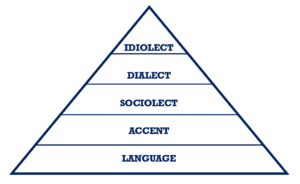Idiolects
Idiolects
What do you think of when you hear the word idiolects? Some may think it’s related to the word ‘idiot,’ while others think it is related to the word ‘dialect.’ The latter is accurate.
Languages, Accents, and ‘-Lects’, Oh My!
Each of us has our own way of speaking a language. This is referred to as idiolect. So, if language and all of the ‘-lects’ were to be placed on a continuum, it would look like this:

I also like to think of it as a cake, one of my favorite desserts. Language is the flavor of the cake (i.e., chocolate, vanilla), the accent is the icing, and the ‘lects’ are the toppings (i.e., sprinkles, nuts, chocolate chips). Every cake will be slightly different (and delicious!).
So, what are these terms? The following are loose definitions.
Language– a system of communication used by a particular country or community
Accent– a distinctive mode of pronunciation of a language
Sociolect– a dialect of a particular social or ethnic group
Dialect– a variety of a language that a group of speakers shares
Idiolect– speech habits of a specific person

Idiolects
Back to idiolects. Each person speaks in their own way. We all have unique ways of pronouncing words, linking words together to form a sentence or question, and even deciding which words to include in their lexicon (vocabulary arsenal).
Like languages, idiolects are a living thing and, therefore, constantly changing. Although, idiolects will change more quickly than a whole language. One’s idiolect will change with many factors such as age, location, SES, education, and social community. So, as one gets older, moves places, becomes more educated, makes more or less money, and changes social groups, their vocabulary, expression, style, and grammar will change.

Forensic Linguistics
Linguistics refers to the scientific study of language and its structure. There are specific branches, which include sociolinguistics and forensic linguistics. Sociolinguistics study the language in relation to social factors (i.e., region, class, educational level, occupation, gender, etc.). Forensic linguistics applies linguistic knowledge to the context of the law. Specifically, forensic linguistics use spoken and written samples to determine if they match a suspect’s idiolect. Think CSI.
The most famous example of forensic linguistics is Ted Kaczynski, the Unabomber. Law enforcement agents published one of his essays, and his sister-in-law read it and thought it matched his writing. The family notified the authorities, and this led to the capture of Kaczynski.
What is Your Idiolect?
Just like fingerprints and snowflakes, no two idiolects are the same. Personality preferences and outside influences influence them. It can be challenging to describe your own idiolect. So, think about the following and post in the comments.
🤔 What has most influenced your idiolect (i.e., celebrities, geography, education, social group)?
🗣 How would you describe your idiolect (grammar, style, expressions, vocabulary)?
✅ What words do you use in your lexicon (vocabulary)?
❌ What words do you not use in your lexicon (vocabulary)?
For more information on dialects, check out my blog post Regional and Ethnic Dialects in the U.S.
For more information on idiolects, check out Babbel’s What is an Idiolect?

One Comment